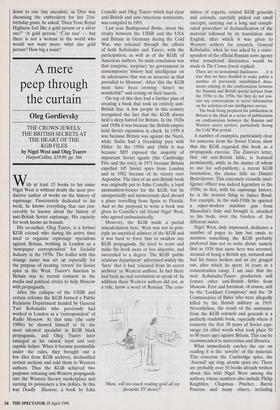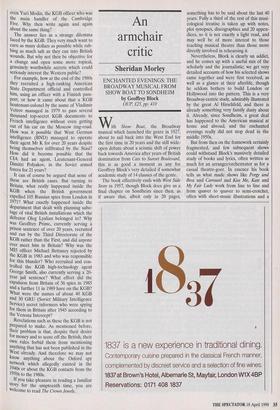A mere peep through the curtain
Oleg Gordievsky
THE CROWN JEWELS: THE BRITISH SECRETS AT THE HEART OF THE KGB FILES by Nigel West and Oleg Tsarev HarperCollins, £19.99, pp. 366 With at least 15 books to his name Nigel West is without doubt the most pro- ductive author of works on the history of espionage. Passionately dedicated to his work, he knows everything that can con- ceivably be known about the history of anti-British Soviet espionage. His capacity for work knows no bounds.
His co-author, Oleg Tsarev, is a former KGB colonel who during his active time used to organise espionage operations against Britain, working in London as a `newspaper correspondent' for Socialist Industry in the 1970s. The leaflet with this strange name was set up especially for the purpose of creating 'covers' for Soviet spies in the West. Tsarev's function in Britain was to recruit contacts in the media and political circles to help Moscow with propaganda.
After the collapse of the USSR and certain reforms the KGB formed a Public Relations Department headed by General Yuri Kobaladze who previously had worked in London as a 'correspondent' of Radio Moscow. At that time (the early 1980s) he showed himself to be the most talented specialist in KGB black propaganda, and Oleg Tsarev later emerged as his valued, loyal and very capable helper. When it became permissible under the rules, they brought out a few files from KGB archives, declassified certain sections and sold them to Western authors. Thus the KGB achieved two purposes: releasing anti-Western propaganda into the Western literary marketplace and earning its pensioners a few dollars. In this way Deadly Illusions, a book by John Costello and Oleg Tsarev which had clear anti-British and anti-American sentiments, was compiled in 1993.
Last year Battleground Berlin, about the rivalry between the USSR and the USA and Britain in Germany during the Cold War, was released through the efforts of both Kobaladze and Tsarev, with the participation, as well as of the KGB, of American authors. Its main conclusion was that (surprise, surprise) no government in contemporary history had intelligence on its adversaries that was as accurate as that provided to Moscow'. After this the KGB must have been crowing 'Aren't we wonderful?' and resting on their laurels.
On top of this they had a further plan of creating a book that took an entirely anti- British line. A few people in this country recognised the fact that the KGB always held a deep hatred for Britain. In the 1920s and 1930s it was because the British empire held Soviet expansion in check. In 1939 it was because Britain was against the Nazis, while Stalin had a friendship pact with Hitler. In the 1950s and 1960s it was because MI5 exposed the majority of important Soviet agents (the Cambridge Five and the rest); in 1971 because Britain expelled 105 Soviet spies from London and in 1982 because of its victory over Argentina. The idea of an anti-British book was originally put to John Costello, a loyal ammunition-bearer for the KGB, but he unexpectedly and mysteriously died aboard a plane travelling from Spain to Florida. And so the proposal to write a book was given to Costello's old friend Nigel West, who agreed enthusiastically.
However, the KGB made a partial miscalculation here, West was not in prin- ciple an uncritical admirer of the KGB and it was hard to force him to swallow any KGB propaganda. He tried to resist and make the book more or less objective, and succeeded to a degree. The KGB 'public relations department' advertised widely the `facts' that it had 'released from its secret archives' to Western authors. In fact there had been no real revelations to speak of. In addition these Western authors did not, as a rule, know a word of Russian. The com- Mum, will too much reading spoil all my favourite TV shows?' mittee of experts, retired KGB generals and colonels, carefully picked out small excerpts, carrying out a long and compli- cated procedure of declassification of the material followed by its translation into English, after which it was given to Western authors for research. General Kobaladze, when he was asked by a corre- spondent of the official Russian news agency what sensational disclosures would be made in The Crown Jewels replied:
There are no sensational disclosures . . . it is true that we have decided to make public a number of previously unpublished docu- ments relating to the confrontation between the Russian and British special services from the 1930s to the 1950s, but they do not con- tain any conversations or secret information on the activities of our intelligence service.
The book being prepared for publication in Britain is the third in a series of publications on confrontation between the Russian and Western secret services, particularly during the Cold War period.
A number of examples, particularly clear for someone from the Soviet Union, show that the KGB regarded this book as a propaganda exercise. The Zinoviev letter, that old anti-British fable, is featured prominently, while in the matter of whom to use for self-publicity, a recent KGB fascination, the choice falls on Dimitri Bystrolyotov. This extremely versatile intel- ligence officer was indeed legendary in the 1930s; in fact, with his espionage history, he is the nearest thing to James Bond. For example, in the mid-1930s he spirited a super-modern machine gun from Mussolini's Italy and brought it, attached to his body, over the borders of five different states.
Nigel West, duly impressed, dedicates a number of pages to him but omits to mention something the KGB probably preferred him not to write about: namely that in 1938 that same hero was arrested, accused of being a British spy, tortured and had his bones broken and an eye gouged out, after which he spent 16 years in a concentration camp. I am sure that the next Kobaladze/Tsarev production will feature other anti-British fables from Moscow. First and foremost, of course, will be the 'Lockhart Conspiracy' and the '26 Commissaries of Baku' who were allegedly killed by the British military in 1919. Nevertheless, the result of the assistance from the KGB colonels and generals is a perfectly readable book, especially where it concerns the first 30 years of Soviet espi- onage (in other words what took place 50 to 80 years ago) against Britain. This can be recommended to universities and libraries.
What immediately catches the eye on reading it is the 'novelty' of the material. This concerns the Cambridge spies, the `Arsenal' spy ring, atomic spies etc. There are probably over 50 books already written about this with Nigel West among the authors, whose numbers also include Philip Knightley, Chapman Pincher, Barrie Penrose and many others, including even Yuri Modin, the KGB officer who was the main handler of the Cambridge Five. Why then write again and again about the same thing?
The answer lies in a strange dilemma faced by the KGB. They very much want to earn as many dollars as possible while rub- bing as much salt as they can into British wounds. But why not then be objective for a change and open some more topical, genuinely worthwhile secrets which could seriously interest the Western public?
For example, how at the end of the 1980s they recruited a high-ranking American State Department official and controlled him, using an officer with a Finnish pass- port, or how it came about that a KGB lieutenant-colonel by the name of Vladimir Vetrov managed in 1979 to pass several thousand top-secret KGB documents to French intelligence without even getting out of his car on the Moscow ring-road. How was it possible that West German intelligence (BND) managed to operate their agent Mr K for over 20 years despite being themselves infiltrated by the Stasi? How did it become possible that the CIA had an agent, Lieutenant-General Dimitri Polyakov, in the Soviet armed forces for 21 years?
It can of course be argued that none of these are British cases. But turning to Britain, what really happened inside the KGB when the British government expelled 105 Russian spies from London in 1971? What exactly happened inside the department that dealt with planning sabo- tage of vital British installations which the defector Oleg Lyalian belonged to? Why was Geoffrey Prime, currently serving a prison sentence of over 20 years, recruited and run by the Third Directorate of the KGB rather than the First, and did anyone ever meet him in Britain? Why was the MI5 officer Michael Bettaney rejected by the KGB in 1983 and who was responsible for this blunder? Who recruited and con- trolled the KGB high-technology agent George Smith, also currently serving a 20- year jail sentence? What effect did the expulsion from Britain of 36 spies in 1985 and a further 11 in 1989 have on the KGB? What were the names of about 40 KGB and 30 GRU (Soviet Military Intelligence Service) secret informers who were spying for them in Britain after 1945 according to the Venona Intercept? Revelations such as these the KGB is not prepared to make. As mentioned before, their problem is that, despite their desire for money and to score off the British, their Own rules forbid them from mentioning anything that has not been published in the West already. And therefore we may not know anything about the Oxford spy network which allegedly existed in the 1940s or about the KGB contacts from the 1950s to the 1980s.
If you take pleasure in reading a familiar story for the umpteenth time, you are welcome to read The Crown Jewels.



























































 Previous page
Previous page